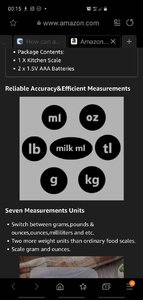- Joined
- Oct 18, 2015
- Messages
- 699
If you read the listing details it shows you this. 
I assume it only measures volume for a set number of substances That have had their volume to weight info préprogrammées into the machine. Sounds like a lot of unnecessary fiddly button pushing when most people have a measuring cup somewhere in the kitchen.
Edit: looks like water and milk are your only options... how very useful.

I assume it only measures volume for a set number of substances That have had their volume to weight info préprogrammées into the machine. Sounds like a lot of unnecessary fiddly button pushing when most people have a measuring cup somewhere in the kitchen.
Edit: looks like water and milk are your only options... how very useful.



300x240.png)